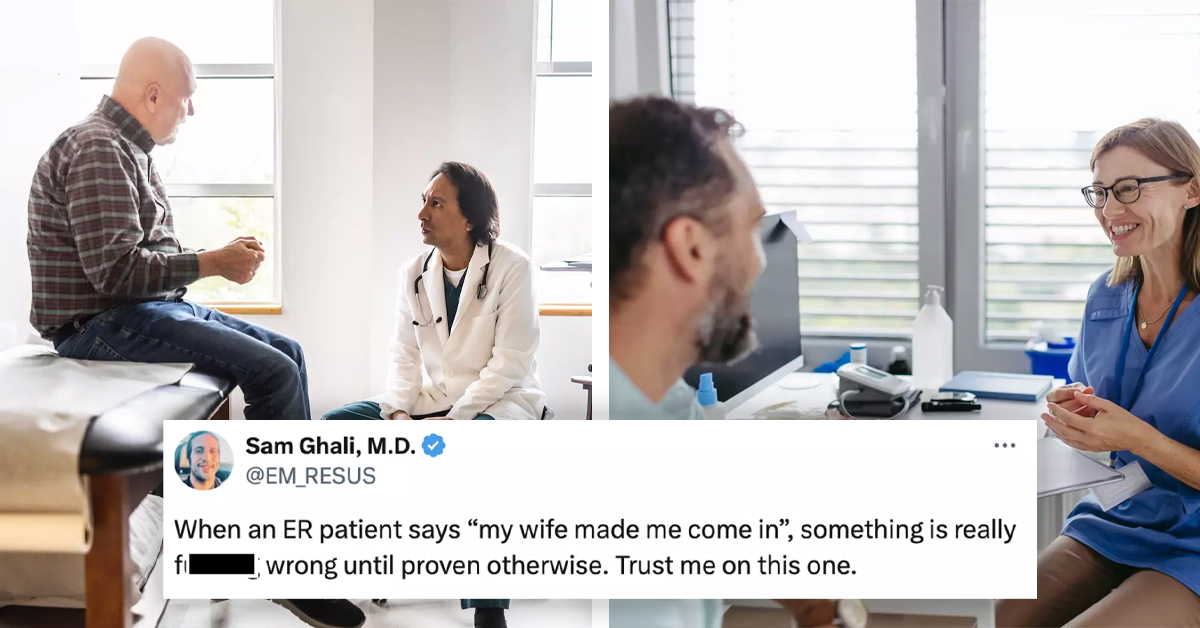
One Sentence From A Patient Can Almost Guarantee A 'Serious Illness,' Doctors Warn
Medics warn that some diagnoses might be as alarming as a heart attack.

Doctors often listen closely to what patients say when diagnosing severe health issues. One particular sentence has caught their attention because it can hint at something serious, even if the patient feels fine. A statement like, “I feel fine, but my wife made me come in,” is a significant clue for doctors.
Often, people may feel perfectly fine and believe they are healthy, but the observations of loved ones can reveal underlying issues. It suggests that the patient might not be fully aware of their health condition, and someone close to them has noticed concerning signs.
This might seem like a harmless remark, but doctors take it very seriously. It often means that the patient might be in worse shape than they realize, and the fact that a loved one is pushing them to get checked out is a big red flag.
Doctors have been talking about this phrase on social media and in online forums where they share medical tips. They call it a "clinical pearl," a helpful clue that something serious might happen. For instance, if a patient says this, it could mean they have conditions like a heart attack or cancer that aren’t immediately obvious.
Also, many severe health conditions, such as high blood pressure or early-stage diabetes, can develop without noticeable symptoms. Regular check-ups and listening to the concerns of loved ones can help catch these "silent" conditions before they become serious.
Emergency room doctor Dr. Sam Ghali agrees with this idea. He uses his social media to share advice about medical emergencies. He says that when a patient mentions their spouse insisted they see a doctor, it usually means a severe problem. According to him, if you hear this, it’s best to assume something is wrong until proven otherwise.
Medical professionals shared their advice on social media.
Subtle cognitive changes, such as forgetfulness or difficulty concentrating, can sometimes indicate the early stages of conditions like Alzheimer's disease or other forms of dementia. Family members often notice these changes first.
 Getty Stock Image
Getty Stock ImageThis isn’t the only phrase that can signal trouble. Other similar phrases, like an elderly person saying, “I don’t want to be a bother, but…” can also signify a serious issue. These patients might be hiding how bad they feel, and doctors take such comments seriously.
Mothers’ instincts are also crucial in medicine. Doctors have found that when a mother feels something is off with her child, it’s often worth paying attention to, even if the child seems fine. In some cases, a mother’s concern led to finding severe problems early, like strokes or other urgent health issues.
Medical professionals encouraged people to heed the advice of their mothers and wives.
 Getty Stock Image
Getty Stock ImageDr. Sam Ghali, known for using his social media to educate the public on medical emergencies, was among those sharing valuable information.
 Twitter
TwitterIf you or someone close to you mentions, “I feel fine, but my wife made me come in,” it’s essential to pay attention and consider a check-up. While these comments might seem minor, they can be significant indicators of underlying health concerns.
Taking such remarks seriously and seeking medical advice can help address potential issues before they become more serious.
Damjan







